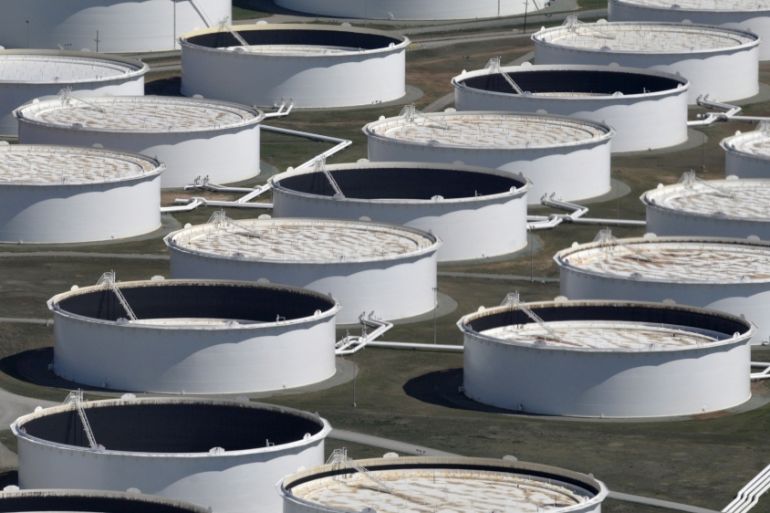Oil under pressure again as storage space gets even tighter
The biggest oil exchange-traded fund is selling near-term contracts as US producers fill emergency stockpile.

Oil prices fell further on Tuesday, adding to huge declines in the previous session, as worries about limited storage capacity for crude led the biggest oil exchange-traded fund (ETF) to unexpectedly begin selling all its holdings of the most active contract.
The United States Oil Fund LP sold all of its West Texas Intermediate (WTI) contracts, significantly widening the spread between July WTI and raising concerns of a repeat of the collapse in May contracts that sent oil below zero for the first time ever last week.
Keep reading
list of 3 itemsLebanon’s first offshore gas drill is a huge disappointment
Argentina plans to fix local oil prices higher: report
US WTI crude futures dropped 15.65 percent to $10.78 per barrel as at 03:03 GMT after it plunged 25 percent in the previous trading session. The WTI May contract tumbled to a record -$37 per barrel shortly before its expiry last week.
Brent crude futures meanwhile fell 4.7 percent to trade at $19.06 a barrel. The benchmark slid 6.8 percent on Monday and the contract for June delivery expires on April 30.
“Clearly everything’s getting dragged down by the machinations in the WTI futures market,” said Daniel Hynes, senior commodity strategist at Australia and New Zealand Banking Group (ANZ) in Sydney.
The main concern is that there is nowhere to store all the oil that is not being consumed due to the drop in global economic activity amid restrictions imposed around the world to curb the spread of the new coronavirus. US producers have started making crude deliveries to the nation’s emergency stockpile as storage space runs out.
The US Oil Fund is moving its money to contracts spread between July 2020 and June 2021 due to new limits imposed upon it by regulators and its broker, according to a regulatory filing. The ETF has changed its investment policy five times in the last two weeks.
Even with the Organization of the Petroleum Exporting Countries (OPEC) and allies led by Russia having agreed record output cuts of nearly 10 million barrels per day (bpd) from May 1, that volume is not nearly enough to offset a drop in demand of about 30 million bpd due to COVID-19 restrictions.
“While we’re starting to see COVID-19 cases ease and some countries ease restrictions, those initial moves look fairly tentative. The market’s coming round to the view there’s going to be no quick recovery in demand,” Hynes said.
As a result of the collapse in demand, global storage onshore is estimated to be about 85 percent full as of last week, according to data from consultancy Kpler.
In a sign of the energy industry’s desperation for places to store petroleum, oil traders are resorting to hiring expensive US vessels to store gasoline or ship fuel overseas, shipping sources said.
“It is hard to see sentiment turning convincingly positive for oil until there’s evidence of OPEC cuts and demand improvement slowing or reversing the global inventory build,” said AxiCorp’s chief global market strategist, Stephen Innes.